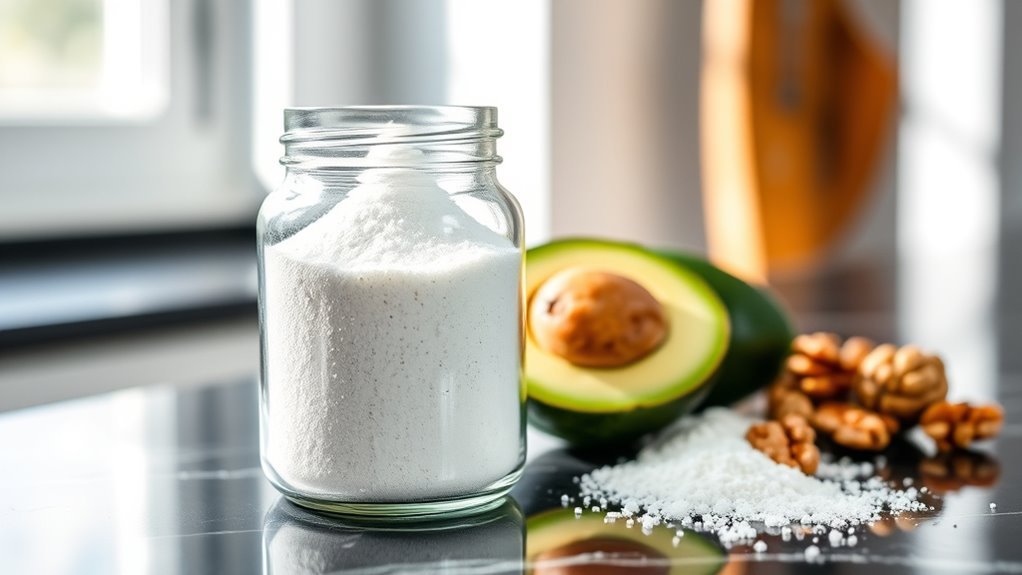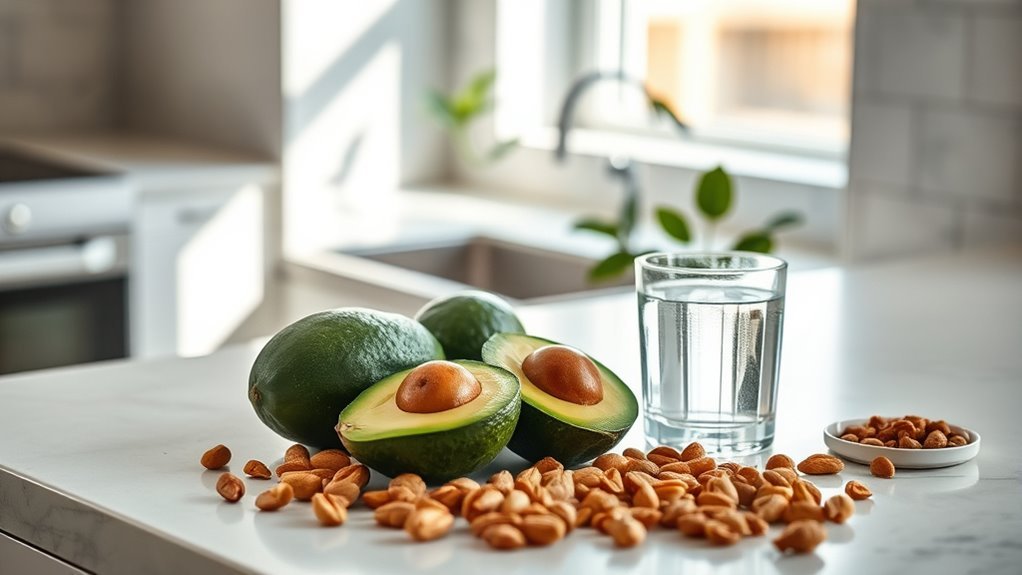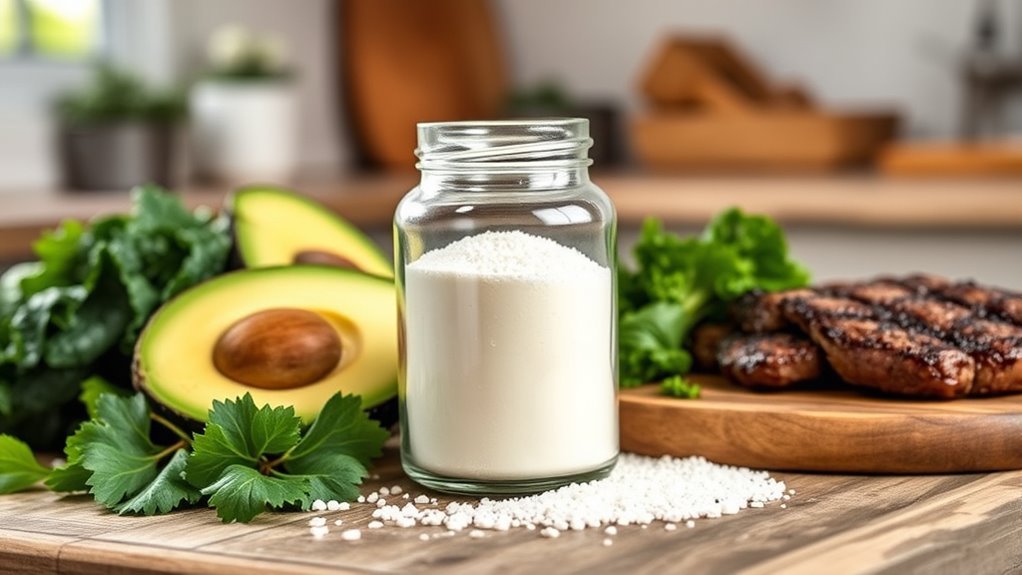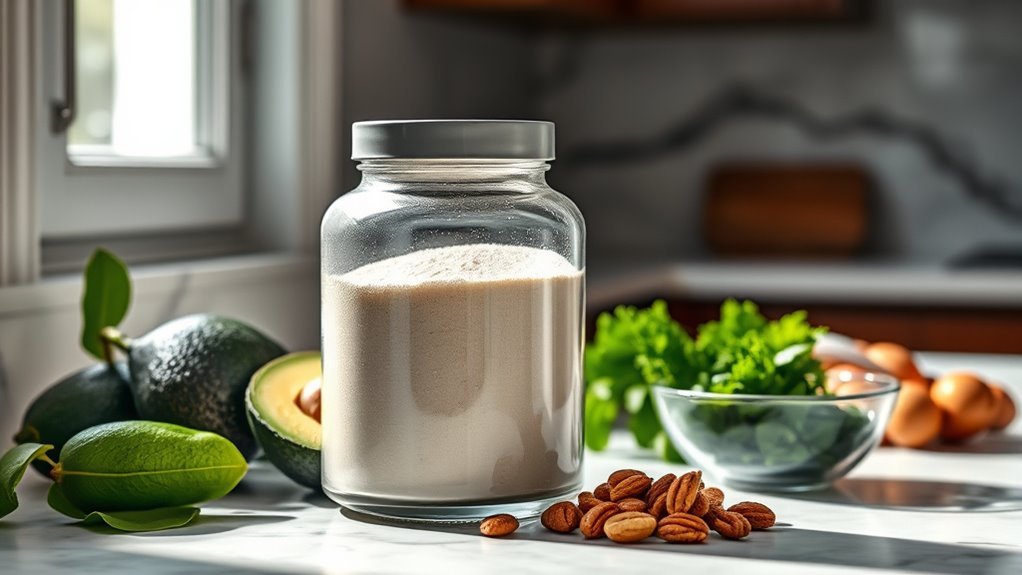Creatine is generally keto-friendly and can enhance your workout performance without disrupting ketosis. It helps replenish ATP for energy, reduces muscle soreness, and supports recovery. While some may experience water retention or digestive issues, the benefits often outweigh these drawbacks. Just stay hydrated and monitor your progress to confirm you’re meeting your ketogenic goals. If you’re curious about how to effectively incorporate creatine into your keto lifestyle and track your results, there’s more to explore.
Understanding the Ketogenic Diet

When you explore the ketogenic diet, it’s essential to grasp its core principles, as this low-carb, high-fat eating plan is designed to shift your body into a state of ketosis. By drastically reducing carbohydrate intake, your body begins to burn fat for fuel, which can lead to significant weight loss and enhanced energy levels—two prominent keto benefits. However, you’ll need to be mindful of dietary restrictions, as not all fats are created equal. Prioritize healthy fats like avocados, nuts, and olive oil while minimizing processed foods. Embracing this lifestyle can offer you greater freedom in managing your weight and health, and an individualized approach can help you adapt the diet to your specific needs. Make sure to consult a healthcare professional before making drastic changes to your eating habits.
What Is Creatine?

Creatine is a naturally occurring compound found in small amounts in certain foods and synthesized by your body, primarily in the liver, kidneys, and pancreas. It plays an essential role in energy production, especially during high-intensity exercise. You can find different creatine types, such as creatine monohydrate, creatine ethyl ester, and buffered creatine, each varying in absorption and effectiveness. Common creatine sources include red meat and fish, but many people opt for supplements to meet their needs. While your body can produce creatine, supplementation can enhance muscle strength and recovery. Understanding these aspects can help you decide if incorporating creatine into your routine aligns with your health goals, especially on a ketogenic diet.
How Creatine Works in the Body

Creatine plays an essential role in energy production by replenishing adenosine triphosphate (ATP), your muscles’ primary energy source during high-intensity activities. It also aids in muscle recovery by reducing muscle cell damage and inflammation following intense workouts. Additionally, creatine enhances performance by allowing you to push harder and longer, making it a popular supplement among athletes.
Energy Production Process
Although many people associate creatine primarily with muscle gain and athletic performance, its role in energy production is equally crucial. Creatine supports ATP synthesis, the primary energy currency in your body. During high-intensity activities, your energy pathways demand quick replenishment of ATP, and creatine acts as a readily available source. By donating a phosphate group to ADP, it rapidly regenerates ATP, allowing you to sustain performance for longer durations. This process is essential, especially when your body shifts into ketosis, where energy from fat becomes more prominent. Consequently, understanding how creatine enhances energy production can empower you to optimize your workouts, regardless of your dietary choices, including a keto lifestyle. Embracing this knowledge can lead to greater freedom in your fitness journey.
Muscle Recovery Benefits
After high-intensity workouts, your muscles need time to recover and repair. Creatine plays a significant role in this process by helping to reduce muscle soreness and enhance recovery strategies. It aids in replenishing ATP levels, which can become depleted during strenuous exercise. By boosting your muscles’ ability to recover, creatine allows you to bounce back faster, making it easier to maintain your workout routine. Research indicates that creatine supplementation can lead to reduced inflammation and faster muscle repair, promoting overall recovery. Incorporating creatine into your post-workout regimen may help alleviate the discomfort of muscle soreness and support your fitness goals. So, if you’re looking for a way to enhance recovery while staying keto-friendly, creatine could be a beneficial addition.
Performance Enhancement Mechanism
Fueling your muscles for peak performance relies on a compound called creatine, which enhances energy production during high-intensity exercises. When you supplement with creatine, you’re fundamentally increasing your muscles’ phosphocreatine stores, allowing for quicker ATP regeneration. This leads to:
- Improved strength and power output
- Enhanced endurance during short bursts of activity
- Better recovery between sets
- Increased muscle mass over time
For best performance enhancement, a creatine dosage of 3-5 grams daily is recommended. Remember, individual responses may vary, so adjust accordingly. Incorporating creatine into your regimen can help you tap into your potential, enabling you to push boundaries and achieve your fitness goals while maintaining the freedom to choose how you fuel your body.
The Role of Carbohydrates in Ketosis
While many people associate ketosis with a low-carb lifestyle, it’s essential to understand the nuanced role that carbohydrates play in this metabolic state. Carbohydrate sources can greatly impact ketosis maintenance. When you consume too many carbs, your body may revert to using glucose for energy rather than fat, which stalls ketosis. However, not all carbs are created equal; certain low-glycemic options can provide necessary nutrients without knocking you out of ketosis. This balanced approach allows you to enjoy some flexibility in your diet while still reaping the benefits of ketosis. Ultimately, understanding how to strategically incorporate these carbohydrate sources can empower you to maintain ketosis without feeling overly restricted. Embracing this knowledge fosters a more liberating dietary experience. Additionally, focusing on net carbs can enhance your ability to enjoy a variety of foods while remaining in ketosis.
Creatine and Ketosis: Compatibility
Understanding the impact of carbohydrates on ketosis sets the stage for exploring how creatine fits into this dietary framework. While you might wonder about creatine’s compatibility with ketosis, it’s essential to evaluate the different creatine types and their potential ketosis effects:
- Creatine Monohydrate: The most researched form, generally safe and effective.
- Creatine Ethyl Ester: Claims of better absorption, but evidence is limited.
- Buffered Creatine: Designed to reduce stomach discomfort, it may appeal to some users.
- Creatine Hydrochloride: Known for easier solubility, but research on its benefits is still ongoing.
Incorporating creatine into a keto regimen generally won’t disrupt ketosis, allowing you the freedom to enhance your performance while maintaining your dietary goals.
Potential Benefits of Creatine on a Keto Diet
When you’re on a keto diet, incorporating creatine can offer significant benefits for your muscle performance and recovery times. Research suggests that creatine supplementation may enhance strength and power, helping you maintain your workout intensity even while in ketosis. Additionally, it can aid in quicker recovery, allowing you to train more effectively over time.
Enhanced Muscle Performance
Although the ketogenic diet is often associated with reduced carbohydrate intake, incorporating creatine can considerably enhance muscle performance for those on this regimen. By providing your muscles with extra energy, creatine may boost both muscle strength and exercise endurance, allowing you to push harder during workouts. Here are some potential benefits:
- Increased phosphocreatine stores for energy production
- Enhanced ATP regeneration during high-intensity activities
- Improved performance in strength training and high-intensity interval workouts
- Greater overall workout efficiency and output
This means you can still achieve your fitness goals while adhering to a keto lifestyle. So, if you’re looking to maximize your performance, creatine might just be the supplement to contemplate. Embrace the potential benefits and take your workouts to the next level!
Improved Recovery Times
While you’re focusing on muscle performance, it’s essential to contemplate how creatine can also support improved recovery times, especially on a keto diet. Creatine may help reduce muscle soreness and enhance your recovery protocols, allowing you to train harder and more frequently. Studies indicate that creatine supplementation promotes faster muscle recovery by replenishing ATP stores, which could be particularly beneficial when following a low-carb regimen.
| Benefit | Effect on Recovery | Evidence |
|---|---|---|
| Reduced Muscle Soreness | Quicker recovery from workouts | Clinical studies |
| Enhanced ATP Resynthesis | Supports energy for recovery | Research findings |
| Improved Muscle Repair | Aids in muscle protein synthesis | Scientific reviews |
Incorporating creatine could be a game changer for your recovery journey.
Possible Drawbacks of Using Creatine While Keto
Using creatine on a ketogenic diet can present some potential drawbacks that you should consider. While creatine can enhance performance, it’s important to be aware of possible side effects that may interfere with your keto adaptation. Here are some concerns to keep in mind:
- Water Retention: Creatine can cause your body to hold onto more water, which might complicate weight loss efforts.
- Digestive Issues: Some users report stomach cramps or diarrhea, especially during the initial phase.
- Impaired Keto Adaptation: Creatine may impact your body’s ability to adapt to burning fats for fuel.
- Increased Caloric Intake: If not monitored, adding creatine can lead to unwanted calories that affect your macros.
How to Incorporate Creatine Into a Keto Lifestyle
Incorporating creatine into your keto lifestyle can be straightforward if you take the right approach. Start by considering creatine timing; many find it beneficial to take creatine post-workout for ideal muscle recovery. This timing can enhance your performance and support your energy levels, even on a low-carb diet. As for dosage recommendations, a common guideline suggests 3-5 grams daily. If you’re just starting, you might opt for a loading phase of 20 grams per day for the first week, divided into smaller doses. Always remember to stay hydrated, as creatine can draw water into your muscles. By following these simple steps, you can effectively integrate creatine into your routine while enjoying the flexibility and benefits of a keto lifestyle.
Monitoring Your Progress on Keto With Creatine
As you commence on your keto journey with creatine, it’s crucial to monitor your progress to confirm you’re reaping the benefits of both. Effective keto monitoring can help you understand how creatine dosage affects your performance and overall well-being. Keep an eye on these key factors:
- Weight Changes: Track any fluctuations, as creatine may cause temporary weight gain due to water retention.
- Energy Levels: Assess your endurance and strength during workouts to see how creatine influences your performance.
- Ketone Levels: Use testing strips to verify you’re staying in ketosis while supplementing with creatine.
- Muscle Recovery: Note how quickly you recover post-exercise, as creatine can enhance recovery times. Additionally, be aware of hidden carbs that may interfere with your weight loss efforts while on keto.
Frequently Asked Questions
Can I Take Creatine on a Strict Keto Diet?
Yes, you can take creatine on a strict keto diet. Creatine benefits include improved strength, enhanced muscle recovery, and increased exercise performance, which can complement your keto supplementation. While some worry about potential carb intake, creatine doesn’t contain carbs, so it won’t disrupt your ketosis. Just remember to stay hydrated, as creatine can pull water into your muscles. Ultimately, it’s a great option to support your fitness goals while enjoying the freedom of a keto lifestyle.
Does Creatine Cause Weight Gain on a Ketogenic Diet?
Oh sure, let’s blame creatine for your weight gain! In reality, it’s more about water retention than actual fat. When you’re on a ketogenic diet, creatine can help with muscle growth, but it also draws water into your muscles, which might make you feel a bit heavier. So, while it doesn’t add fat, it could play tricks on your scale. Embrace the gains, just know what’s really happening!
Are There Specific Types of Creatine Suitable for Keto?
Yes, some creatine types are more keto-compatible than others. Creatine monohydrate is a popular choice due to its effectiveness and lack of added sugars or carbs. Creatine HCL is another option, known for its solubility and absorption. Both can fit well within a ketogenic diet. Just be sure to check the label for any hidden carbs in flavored or mixed formulations to maintain your diet’s integrity while supplementing.
How Does Creatine Affect Energy Levels on Keto?
Creatine can considerably boost your energy levels on keto, as studies show that it enhances energy production by up to 15%. This is especially beneficial during high-intensity workouts. By increasing phosphocreatine stores, creatine supports quicker muscle recovery, allowing you to train harder and more frequently. Even on a low-carb diet, it helps maintain your performance, making it a valuable supplement for those seeking both energy and recovery while enjoying their keto lifestyle.
Can Creatine Impact Ketosis or Fat Burning?
Yes, creatine can impact ketosis and fat burning, but its effects are nuanced. While creatine itself doesn’t kick you out of ketosis, it might influence fat loss by enhancing exercise performance. Improved workouts can lead to better muscle retention and fat loss, essential for those in ketosis maintenance. Just remember, individual responses may vary, so it’s wise to monitor how your body reacts to guarantee you’re reaching your health goals effectively.
References
- https://www.healthline.com/nutrition/creatine-keto
- https://www.ncbi.nlm.nih.gov/pmc/articles/PMC7573447/
- https://www.webmd.com/diet/what-is-keto-diet
- https://www.mayoclinic.org/healthy-lifestyle/nutrition-and-healthy-eating/expert-answers/keto-diet/faq-20431148
- https://www.verywellfit.com/what-is-keto-diet-5181236
- https://www.sciencedirect.com/science/article/pii/S2212267217301262
- https://www.ncbi.nlm.nih.gov/pmc/articles/PMC7455002/
- https://www.nutrition.org.uk/healthyliving/healthyeating/creatine.html
- https://www.bbc.co.uk/news/health-56413051


